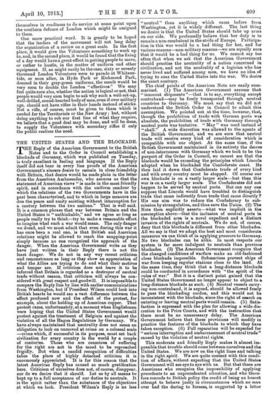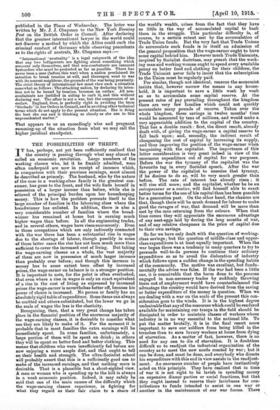THE UNITED STATES AND THE BLOCKADE.
THE Reply of the American Government to the British Notes and to the Order in Council establishing a blockade of Germany, which was published on Tuesday, is truly excellent in feeling and language. If the Reply itself did not bear in every line proofs of the American Government's sincere desire to remain in close friendship with Britain, that desire would be made plain in the letter from the American Ambassador, who assures us that the statement of American views "is made in the most friendly spirit, and in accordance with the uniform candour by which the relations of the two Governments have in the past been characterized, and to which in large measure are due the peace and amity existing without interruption for a century between the two nations." That is well said. It is a common phrase that war between Britain and the United States is "unthinkable," and we agree so long as people really try to think—try to make a reasonable effort to imagine what such a war would mean. The only danger we dread, and we must admit that even during this war it has once been a real one, is that British and American relations might be allowed to reach the snapping-point simply because no one recognized the approach of the danger. When the American Government write as they have just written in their Reply there is not the least danger. We do not in any way resent criticism and remonstrance so long as they show an appreciation of what the Allies are trying to do and what their motives and temper are. If criticism does not leave it to be inferred that Britain is regarded as a destroyer of neutral trade without reason, that criticism will always be con- sidered with neat respect and goodwill. It is impossible to compare the great line by line with earlier communications from Washington, but if President Wilson could look into British hearts he would see a vast difference between the effect produced now and the effect of the protest, for example, about the holding up of American copper. That protest came, unfortunately, at a moment when Englishmen were hoping that the United States Government would protest against the treatment of Belgium and against the violation of all the Hague Regulations by Germany. We have always maintained that neutrality does not mean an obligation to look on unmoved at crime on a colossal scale —crime which, if successful in its purpose, must set back civilization for every country in the world by a couple of centuries. Those who are conscious of suffering for the right are not in the mood to be reproached frigidly. But when a candid recognition of difficulties takes the place of highly detached criticism it is enormously appreciated. It is for this reason that the latest American Reply has caused so much gratification hero. Criticism of ourselves does not, of course, disappear, nor do we desire that it should. Let us by all wee= be kept up to a full acceptance of our duties to neutrals. It is the spirit rather than the substance of the objections at which we look. President Wilson's Reply is no less
"neutral" than anything which came before from Washington, yet it is widely different. The last thing we desire is that the United States should take up arms on our side. We profoundly believe that her duty is to remain anon-combatant in the strife of Europe. Participa. tion in this war would be a bad thing for her, and for various reasons—non-military reasons—we are equally sure that it would be a bad thing for us. We cannot say too often that when we ask that the American Government should practise the neutrality of a nation concerned in civilization, and not the neutrality of a logician who has never lived and suffered among men, we have no idea of trying to coax the United States into the war. We desire the exact contrary.
The chief points of the American Note are easily sum- marized. (1) The American Government assume that "innocent shipments "—that is to say, everything except contraband—may be freely transported through neutral countries to Germany. We must say that we did not understand the British Order in Council to admit this assumption. We pointed out at the time, however, that, though the prohibition of trade with German ports was absolute, the prohibition of trade with Germany through neutral ports was tentative. " May " was used instead of "shall." A wide discretion was allowed to the agents of the British Government, and we are sure that neutral trade will receive every kind of consideration which is compatible with our object. At the same time, if the British Government maintained in its entirety the decree of non-intercourse with Germany which we took to be the purport of the Order in Council, we cannot see that the blockade would be exceeding the principles which Lincoln adopted when be blockaded the Confederate coast. He then laid it down that Confederate trade of every kind and with every country must be stopped. Of course our own blockade is on a vastly larger scale—but then this war is on a vastly larger scale. The Confederates did not happen to be served by neutral ports. But can any one suppose that Lincoln would have troubled to distinguish trade that came indirectly from trade that came directly ? His one aim was to reduce the Confederacy to sub- mission by strangulation, and thus save the Union. (2) The Note then explicitly asserts—what was implicit in the assumption above—that the inclusion of neutral ports in the blockaded area is a novel expedient and a distinct invasion of the rights of neutrals. We do not, of course, deny that this blockade is different from other blockades. All we say is that we adopt the best and most considerate measures we can think of in applying pressure to Germany. No two blockades can be alike. In most respects our system is far more indulgent to neutrals than previous blockades. (3) The American Government recognize that the changed conditions of warfare make an old-fashioned close blockade impossible. Submarines prevent ships of war from keeping regular stations close to the land. At the same time, they think that a long-distance blockade could be conducted in accordance with "the spirit of the rules of war." But it is a distinct point gained that the United States Government no longer appear to object to a long-distance blockade as such. (4) Neutral vessels carry- ing non-contraband, it is argued, should be allowed freely to pass the blockading cordon, and this would not be inconsistent with the blockade, mince the right of search on entering or leaving neutral ports would remain. (5) Satis- faction is expressed with the plan for allowing a wide dis- cretion to the Prize Courts, and with the instruction that there must be no unnecessary delay. The American Government believe that these provisions will modify in practice the features of the blockade to which they have taken exception. (6) Full reparation will be expected for "serious interruption and embarrassment of neutral trade" caused by the violation of neutral rights.
This moderate and friendly Reply makes it almost im- possible that trouble should come between ourselves and the United States. We are now on the right lines and talking in the right spirit. We are quite content with this condi- tion of affairs without expecting that the United States Government will see eye to eye with us. But that there are Americans who recognize the impossibility of applying precedents to an unprecedented situation, and who there- fore concede to British policy the credit of being an honest attempt to behave justly in circumstances which no man ever had the daring to foresee, is suggested by a letter
published in the Times of Wednesday. The letter was written by Mr. J. J. Chapman to the New York Evening Post on the British Order in Council. After declaring that the greatest international lawyer in the world could not discover a method by which the Allies could curb the criminal conduct of Germany while observing precedents as to the rights of neutrals, Mr. Chapman says :— "International 'neutrality' is a legal outgrowth of the ides, that any two belligerents are fighting about something which concerns only themselves, and that non-combatants are innocent bystanders who most be protected as far as possible. There has sorer been a case (before this war) when a nation proclaimed its intention to break treaties at will, and thereupon went to war with its nearest neighbour, the grounds of the war being proximity. The strict theory of international law must view such a situation somewhat as follows : The attacking nation, by declaring its inten- tion not to be bound by treaties, becomes an outlaw. All non- combatants are justified in aiding to curb it, and this without declaring war. The affair is not a war, but the suppression of an outlaw. England, then, is perfectly right in avoiding the term • blockade ' in her Orders in Council, and in avoiding other technical terms which do not apply to the present situation. she is doing the best she can and is thinking as clearly as she can in this unprecedented matter."
That appears to us an exceedingly wise and pregnant pumming-up of the situation from what we may call the higher juridical standpoint.







































 Previous page
Previous page